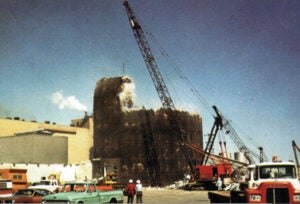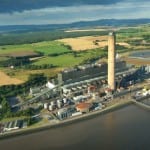The UK has canceled its flagship £1 billion ($1.5 billion) competition to help commercialize carbon capture and storage (CCS) technology from power plants.
The decision by the Department of Energy and Climate Change (DECC) was announced in a three-sentence release to the London Stock Exchange just days before crucial climate change negotiations are due to begin in Paris. It means that the program begun in 2007 and now in its final stretch will not continue.
Projects In Limbo
It also means that two much-watched projects competing under the program—two of the world’s biggest carbon capture power projects under development—are at risk of being canceled: Shell and SSE’s Peterhead project at a gas-fired power plant in Scotland and Drax’s 426-MW White Rose project. The DECC said it would “engage closely with the bidders on the implications of this decision for them.”
Energy company Drax had shelved its $1.5 billion White Rose project in North Yorkshire at the UK’s biggest coal plant this September, citing the government’s decision to reduce subsidies for renewable energy. As the largest generator of renewable power in the UK, Drax said that reduced subsidies for renewables had “suddenly removed a stream of income,” reducing cash available for future investments.
“It is too early to make any definitive decisions about the future of the White Rose CCS Project, however, it is difficult to imagine its continuation in the absence of crucial Government support,” said Leigh Hackett, CEO of Capture Power, the engineering consortium developing White Rose.
In a separate statement on Nov. 25, SSE also expressed disappointment about the government’s decision. “SSE believes this decision represents a significant missed opportunity for the UK,” it said.
An Up-and-Down History
The UK CCS demonstration competition was launched in November 2007 with the final goal to demonstrate a full CCS chain by 2014. When originally introduced, the competition required all contenders to agree to use post-combustion technology to capture 90% of greenhouse gases from a coal plant. However, the £1 billion grant evaporated in December 2011 after the DECC failed to reach a financing deal with one remaining finalist—Scottish Power’s Longannet project.
In April 2012, however, the UK opened a second £1 billion competition to support “practical experience in design, construction, and operation of commercial-scale CCS” to both gas- and coal-fired power plants. Later that year, the DECC issued a shortlist of four contenders: Teesside, White Rose, Peterhead, and Captain Clean Energy. Shell and SSE’s Peterhead project in Scotland and the White Rose project were named as the two preferred bidders in March 2013.
The DECC’s decision to scrap the competition comes on the heels of a declaration by Energy and Climate Change Secretary Amber Rudd last week that the UK will restrict the use of the country’s coal-fired power stations by 2023 and close all of the facilities by 2025.
Challenging Commitments
The UK has pledged to reduce its greenhouse gas emissions by 40% compared to 1990 levels by 2030. For groups like the European Technology Platform for Zero Emission of Fossil Fuel Power Plants (ZEP) that are banking on CCS technology to ensure the future of fossil fuel energy, the DECC’s decision—made just days before COP21 talks will begin in Paris—is “regrettable and counterproductive.”
“We know that CCS is absolutely necessary if we are to achieve enough of a reduction in carbon emissions so as to remain below a 2C degree rise in temperature,” said ZEP Chairman Dr. Graeme Sweeney. “Failing to deploy CCS will leave Europe with a bill of €1.2 trillion and result in the loss of those industries which are unable to achieve their carbon reduction targets,” Dr. Sweeney concluded.
—Sonal Patel, associate editor (@POWERmagazine, @sonalcpatel)










